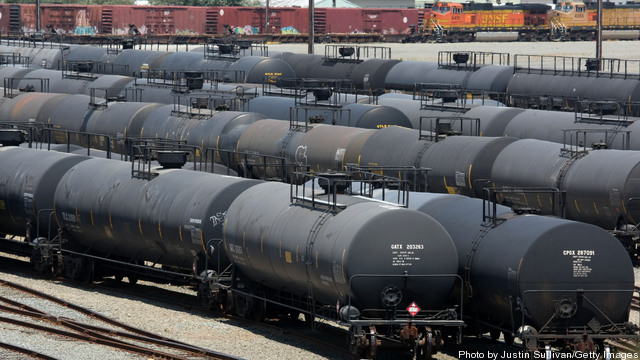
US refining economics have been under pressure in recent years, particularly on the East Coast, where lack of infrastructure or bottlenecks forced some refineries to process crude imported from overseas markets at prices linked to the more expensive Brent benchmark. But independent refiner PBF Energy saw an opportunity and bought 3 major facilities between late 2010 and early 2011 in an effort to access increasing volumes coming on from the Bakken region and Western Canadian oil sands via rail.
PBF acquired 2 refineries located in Delaware City, Delaware and Paulsboro, New Jersey from Valero with a combined refining capacity of 370,000 b/d. Crude was traditionally transported to these plants via barge and ship along the Delaware River, but PBF constructed a crude rail unloading facility at the Delaware City refinery designed to accept shipments from the Mid-Continent and Western Canada at prices linked to West Texas Intermediate – the US benchmark grade – currently trading at a roughly $20/barrel discount to Brent.
PBF recently conducted an initial public stock offering which company representatives told Breaking Energy prevents them from discussing corporate operations beyond those details contained in their prospectus.
One of the keys to the company’s business strategy is an agreement to lease 2,400 rail cars, “comprised of approximately 1,600 coiled and insulated railcars that are capable of transporting Western Canadian bitumen without diluent and approximately 800 general purpose railcars) that are currently scheduled to be delivered through the second quarter of 2014 and which will be utilized to transport crude by rail to Delaware City,” according to the PBF website.
Delicately Balanced, For Now
The crude rail unloading facility at Delaware City is reportedly being expanded from a current capacity of 40,000 b/d to 110,000 b/d, scheduled for completion in early 2013. There is a shortage of crude rail cars in the US due to rapidly increasing Bakken output and it is unclear whether this will effect operations during the interim period between completion of the PBF rail facility expansion and delivery of the additional leased crude rail cars.
The refining business will remain in a precarious economic position as long as it relies on the difference between multiple – often volatile – commodity prices, including crude oil, natural gas, finished products like gasoline diesel and jet fuel, as well as natural gas liquids and petrochemicals.
But as long as the structural price spreads that have emerged between Brent/WTI and natural gas/crude oil remain intact – and pipeline bottlenecks continue to impede Bakken liquids evacuation – it appears there will be a business case for railing crude east.
Watch this short video in which a representative of Enbridge – a pipeline company – discusses the firm’s plans for transporting petroleum to Eastern North America.
